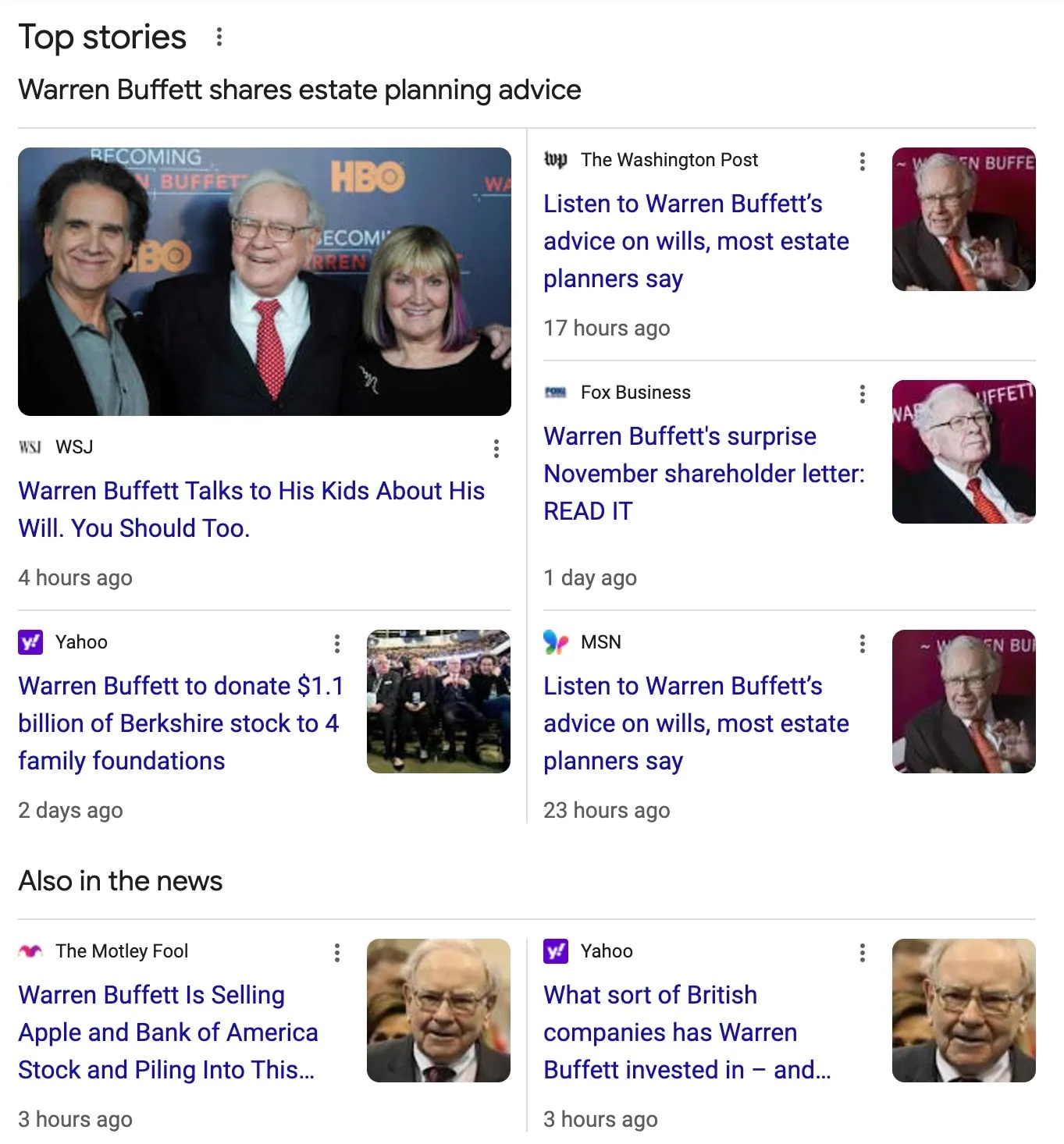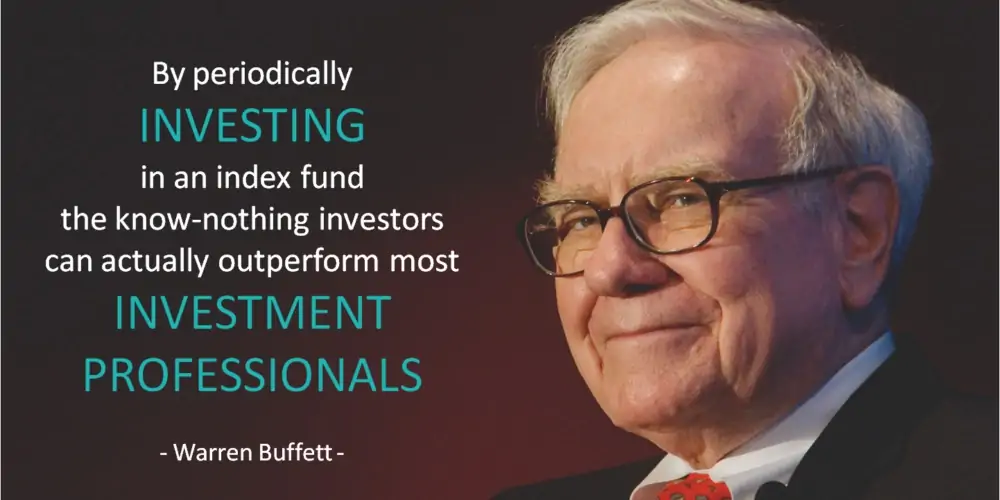I’ve spent 13 years reporting on and analyzing the investment space, and no single person has accounted for more of my attention than billionaire, longtime Berkshire Hathaway (BRK.B) CEO, and ukulele aficionado (no, seriously!) Warren Buffett.
Everyone’s favorite financial nonagenarian has been a staple of the financial media world for decades. People want to read about him, and boy howdy, do we supply it.
Search “Warren Buffett” at any given time, and chances are you’ll see a stream of stories about his latest stock moves, Berkshire shareholder letters, or recent musings.

To be fair, the musings covered above are from his latest shareholder letter, so it’s not a true trifecta, but awfully close.
Why Are We Fascinated by Warren Buffett?
So, why exactly are we so fascinated by Warren Buffett?
Young and the Invested Tip: You don’t need to be Buffett to find good stocks to buy. There are several top stock analysis websites to help.
In a moment, we’ll ask that (and a few other Buffett-related questions) of our guest this week—Chris Ballard, CFP®, Managing Director at Check Capital Management, a Registered Investment Advisor.
But first, I’ve put in the time, so I’ll put forth a few thoughts.
I think the base assumption here is that most people want to mirror Buffett’s success. Which, sure! Why wouldn’t they?
- The guy bought his first stock at age 11 (1942).
- He bought a pinball machine for $25 at age 16 (1946)—not to play, but to put to work in a barbershop. (He later told Bill Gates he built “a small empire” out of that machine.)
- Buffett cooked up his first investment partnership at age 25 (1956)
- He reached $1 million in net worth by the time he was 32 (1962). Which, by the way, that $1 million then would be worth more than $10 million today.
- That same year, he began investing in Berkshire Hathaway. Three years later (1965), he owned enough to formally take control.
- He became a billionaire by age 55 (1985).
- He first became the world’s richest person at age 78 (2008), at an estimated value of between $58 billion and $62 billion. He has largely sat in the top 10 since then.
- Berkshire Hathaway is consistently among the nation’s 10 largest companies by market capitalization, and often the largest non-tech-related firm.
Note: Buffett was born Aug. 30, 1930, so the ages and years above might add up differently depending on when in the year the milestone was achieved.
Featured Financial Products
But there are many, many other billionaires the world over. Always have been. Always will be.
And yet, we in the financial media have tried replicating Warren Buffett fever—writing stories about other billionaires’ stock picks, financial habits, and words of wisdom—for years, with little to show for it.
Because Buffett’s popularity is about more than just the numbers.
It’s one man’s opinion, but Buffett is perhaps the most relatable of the Wall Street billionaires.
For one, he’s not a Wall Street billionaire—he’s the “Oracle of Omaha.” While he did get a master’s in economics from Columbia University and worked in New York for a few years, he has spent the lion’s share of his life in Nebraska, most of it in Omaha. The man’s a Midwesterner. He lives in Big Ten Country*.
His wisdom is elegant, in the scientific sense of the word. While you and I don’t enjoy many of the same advantages he does—BofA isn’t offering us a special class of preferreds because we bought a handful of shares!—his lessons are simple and applicable. Pick businesses, not stocks. Invest in what you understand. Price is what you pay; value is what you get.
Young and the Invested Tip: These are some of the best stocks to buy and hold forever.
While I can’t speak to this personally—I haven’t met the man—he’s widely reported as being good-natured, humble, reasonable, patient, and frugal. You’d be lucky to get one or two of these qualities out of a modern billionaire, but Buffett, more than just about anyone in the jet set, seems like the kind of guy you would want as a next-door neighbor.
Buffett also is wealthy despite himself. The man has donated more than $58 billion to a variety of causes—though primarily the Bill & Melinda Gates Foundation—since 2006. And he’s even tasked his children for giving away most of his remaining wealth once he passes.
And lastly, Buffett has pretty ordinary interests. Sure, he golfs—what C-suiter doesn’t? But he also loves to play bridge. He drinks Coca-Cola and eats Utz potato sticks. He can strum a ukulele.
Back out those billions, and the guy is just a guy. And I mean that in the most complimentary way.
Featured Financial Products
Why We Like Warren Buffett
Of course, you can’t just back out the billions. Which means when it comes to adoring Buffett, it’s OK to love his quirks … but if we really want to be more like Warren Buffett, we have to be a little more discerning.
For one, he’s not perfect. No one is! But more importantly, Buffett has advantages we simply don’t, making some of his advice less applicable than others.
That’s why this week, we’ve sat down to ask Chris Ballard, Managing Partner at certified financial advisor company Check Capital Management, a little bit more about Warren Buffett: Why we like him, of course, but also whether it pays to look at his portfolio, and which advice the everyday investor is best-positioned to use.
Young and the Invested: Plenty of billionaire investors have achieved investing success—after all, they’re billionaires. What is it about Buffett explicitly that has made him such a popular figure in the media and among regular investors?
Chris Ballard: Buffett has been as much a teacher as he has been an investor, and the way he teaches is through his words, both written and spoken, and by example. He is honest, straightforward and willing to speak his mind and caution against what he considers hazards, whether you are an investor or not. He is as down to earth and wholesome as any Midwesterner could be at nearly 100 years of age.
Warren has defied the odds, and everyone loves it when the good guys win.
Related: 12 Best Long-Term Stocks to Buy and Hold Forever
Young and the Invested: What do you think about the popular practice of looking at the Berkshire portfolio for investing ideas?
Ballard: The practice at looking at the portfolios of successful investors is mostly a healthy endeavor. It can be a guide of sorts.
At the same time, it’s important to do your own homework and not just rely upon someone else’s ownership as confirmation that you should also be partnering with a business through shared ownership.
It’s important to know your own strengths and weaknesses, which are surely different than Warren’s. In the case of Berkshire’s portfolio, Buffett has owned some stocks for a very long time. Take American Express (AXP); he first bought shares 50 years ago. Using this holding as a possible new investment idea just because Warren owns it might be taking things too far. It’s a great company, and might be worth owning, but the decision criteria to buy this stock today versus whether Berkshire should continue to own it are indeed different imperatives.
Related: 8 Best Stock Picking Services
Young and the Invested: Obviously, given the difference between Buffett’s Berkshire war chest and the average investor’s portfolio, the everyday investor can’t necessarily put all of Buffett’s strategies and wisdom to work. Which of Buffett’s values and strategies can most people implement with a decent hope of success?
Ballard: The vast majority of individuals can apply the same principles Buffett has espoused through the decades; the question lies in whether they will be successful doing so.
It’s important to define what an “everyday investor” is. For the most part this means individuals who are not professional investors or financial advisors. Most people are not Warren Buffett—and I don’t mean they don’t have his wealth or experience, but they don’t have his innate talents, acumen, and temperament.
Young and the Invested Tip: Looking for the best high-yield dividend stocks for your portfolio? Check here.
There are unfavorable statistics on this group of investors in that they tend to follow the crowds more often than not, and are susceptible to influences that can lead to unpleasant outcomes. For most people, it’s best to focus on things that can be controlled, like how much they spend and how much they can pay their future selves through savings.
After that, the values and strategies Buffett would advise the average investor is to buy and hold a low-cost index fund and don’t touch it.
Becoming Warren Buffett is likely not in the cards for any of us. That said, if the everyday investor decides that becoming an investment professional is something they might want to do, and that they want to do more than just invest in low-cost index funds, reading all of Buffett’s letters to Berkshire shareholders (which are available to the public) and Benjamin Graham’s The Intelligent Investor is probably the best place to start.
Featured Financial Products
Young and the Invested: Is there anything within the Buffett mystique, or any advice that he’s given, that you explicitly think investors should ignore, whether because it’s simply not applicable or even inaccurate?
Ballard: I personally feel Buffett’s story is one everyone should be interested in. He isn’t a perfect human being—no one is. But he strives to live life in a way that makes him and others happier and better individuals, and he helps further the idea of what’s possible. I won’t dissuade anyone from investigating Berkshire Hathaway or Warren Buffett and coming to their own conclusions.
Well, maybe I have one differing opinion: Eating vegetables and getting good exercise are probably good for most of us.
Young and the Invested: Everyone loves themselves a good Buffett quote. Any in particular that you live by, or that you think are applicable to most people?
Ballard: “Predicting rain doesn’t count; building the arc does.”
Like what you’re reading but not yet a subscriber? Get our weekly financial insights and updates delivered to your inbox every Saturday morning by signing up for The Weekend Tea today! You can also follow us on Flipboard for more great advice and insights.




